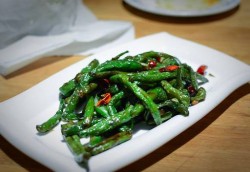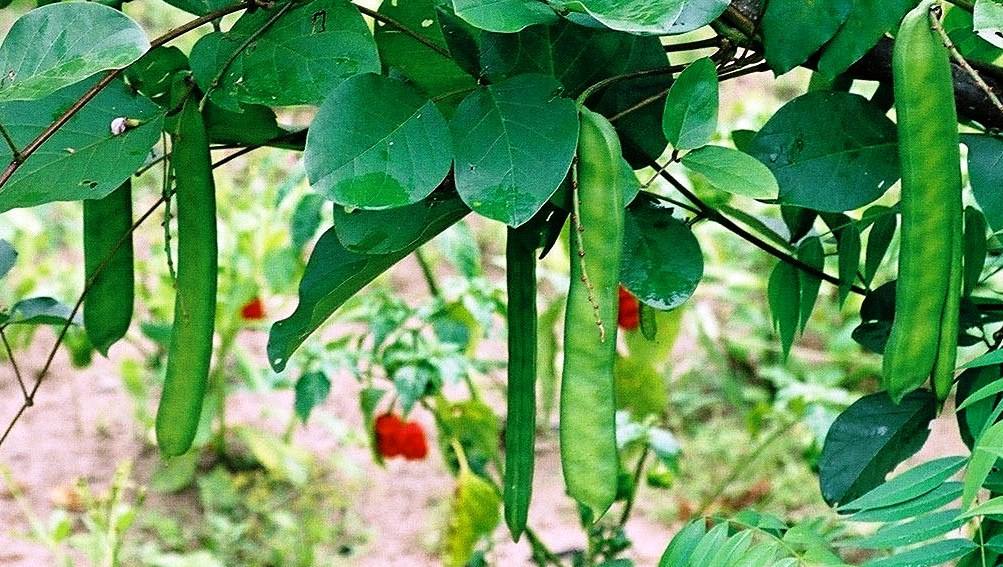Sweet in flavor and bursting with nutrients, sword bean or Canavalia gladiata is a cultivated species of beans that is often considered to be underutilized. It belongs to the Leguminosae family, which is believed to have its origins in the Asian continent. Nowadays they are cultivated throughout Asia, Africa, West Indies, South America and tropical regions of Australia. The numerous health benefits and medicinal effects of this vegetable have made it a magic ingredient in health drinks, tea, supplements and even in toothpaste and soap. These beans are energy boosters and are a great source of protein.
Nutritional value of sword bean

Sword bean is a great source of protein, fiber, carbohydrates and fat. Studies reveal that it contains some of the major minerals including calcium, potassium, magnesium, sodium, and phosphorous, and minor minerals such as copper, iron and zinc. Vitamins like vitamin A and vitamin C are present in higher amounts in this legume. Raw sword bean has been found to have more mineral content that the processed form. The presence of these essential minerals make the sword beans a nutritionally important food item. This vegetable contains many of the essential amino acids such as glutamine, leucine, arginine, phenylalanine, lysine, isoleusine and valine. It is also a good source of fatty acids like Palmitic acid, oleic acid and linoleic acid. In addition to these nutrients, sword bean is also found to have certain anti-nutrients such as alkaloid, tannin, saponin, oxalate, and phytate.
Health benefits of sword bean
The high nutritional value of sword beans makes it a very healthy and perfect addition to your regular diet. Sword bean tea, which is made from the roasted seeds of sword bean is considered to be a nutritious and health benefitting drink.
Sword bean enhances the functioning of your nervous system
The seed of sword bean is eaten as a dietary supplement in many parts of Asia and Africa to improve alertness and strength. Extracts obtained from these seeds are found to stimulate the nervous system by helping to maintain the levels of chemicals in the brain such as dopamine, epinephrine, norepinephrine, and serotonin. These chemicals work together to improve your focus and concentration and also provides you with increased energy.
Sword bean has anti-parkinsonian effect
Various extracts of Canavalia gladiata seeds that were tested on mice revealed that the alcoholic extract helped in increasing the grip strength spontaneous motor activity, and alertness. Because of its potential antioxidant activity and the presence of L-dopa and polyphenols, sword bean appears to be a beneficial legume for people suffering from Parkinson’s disease.
Sword bean extract may be effective against alveolar bone resorption
Sword bean contains good amounts of canavanine and is a very important ingredient in Japanese and Chinese herbal medicine for the treatment of pus discharge. Studies were conducted to find out the effect of sword bean extract on oral bacteria and human oral epithelial cells and the growth and development of alveolar bone resorption induced by Porphyromonas gingivalis infection in rats. The results suggest that sword bean extract may have the potential to fight against Porphyromonas gingivalis caused by Porphyromonas gingivalis infection.
Hepatoprotective activity of sword bean root extract
The liver plays a key role in maintaining metabolic functions and in detoxifying your body. Studies were performed to evaluate the hepatoprotective effect of the root extract of sword bean against liver damage induced by D-galactosamine (D-GalN). The results showed that the canavalia gladiata extract helped in the recovery of lesions in the liver that were caused by D-galactosamine. It also helped in restoring the normal structure and functioning of liver hepatocytes. Thus it could be concluded that sword bean root extract is beneficial in protecting the liver from serious damages induced by D-GalN. It could also be used as a potential remedy for managing disorders of the liver.
Sword bean and anti-cancer effect
From several studies, it has been found that a fermented solution of sword bean has an inhibition effect on cancer cells and is capable of removing human liver cancer cell line, HepG2. Although it helps in killing the liver cancer cells, it does not produce any adverse effects on the normal and healthy cells in your body. Another study indicates that flavonoids such as rutin found in the seeds of sword bean may help in decreasing precancerous lesions that may occur in the large intestine. Beta-aminopropionitrile is another phytochemical that is effective in inhibiting growth of breast adenocarcinoma.
Sword bones have a positive effect on bone metabolism
Studies conducted on rats on the effect of soy beans and sword beans on the bone metabolism suggested that these legumes were beneficial in offering protection from bone loss by preventing bone resorption and inhibiting bone turnover. In addition to this effect, the regular consumption of sword beans may also be helpful in preventing osteoporosis that may occur post-menopause.
Uses of sword bean
The young pods of sword bean are cooked and eaten as a vegetable in many parts of Asia. Since it is a great source of protein, sword bean is used to make supplements. The seeds of canavalia gladiata have high amounts of the enzyme urease and hence it is also used in the commercial production of this enzyme. Urease is important in clinical laboratories as it is used to determine the presence of urea in the blood. Sword bean is also used as a green manure and cover crop. In some places it is grown as an ornamental plant over walls, houses and fences. Korean traditional medicine considers this bean effective in the treatment of many health problems including asthma, headache, cough, vomiting, abdominal pain, dysentery, lumbago, obesity, epilepsy, schizophrenia, athlete’s foot, acne, and inflammatory diseases. Japanese medicine considers this legume useful in the treatment of pyorrhea, hemorrhoids, cancer, otitis media, boils and many kinds of inflammatory diseases.

The scarcity of food supply in comparison to the rise in human population is a scary threat all over the world. Legumes such as sword bean have been underexploited in spite of their high protein and nutrient content. The advantage of legumes is that not only are they healthy and nutritious but they are also inexpensive and cost effective for people with low income. Moreover they are easy to cultivate. In several underdeveloped countries, legumes form an important source of energy and protein. Sword bean is one such legume plant that has the potential to become a healthy food source and a solution to the growing food shortage crisis.

